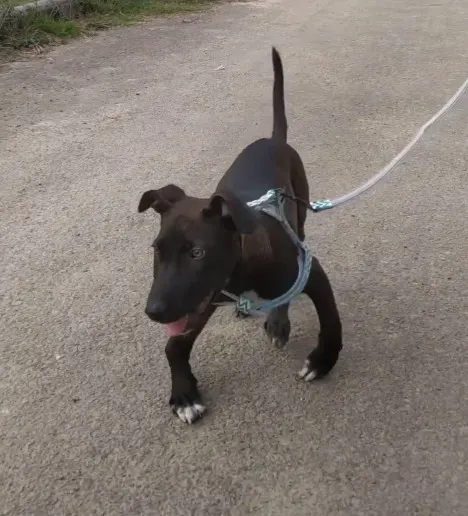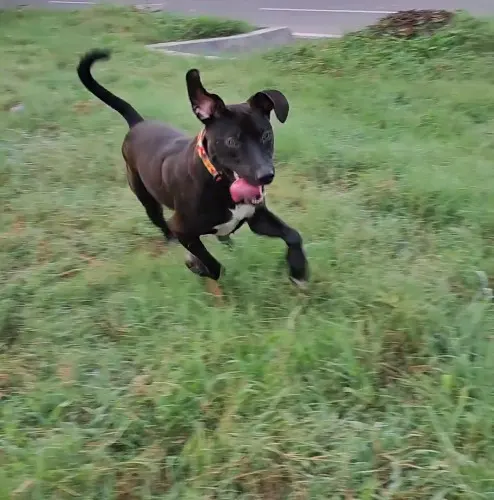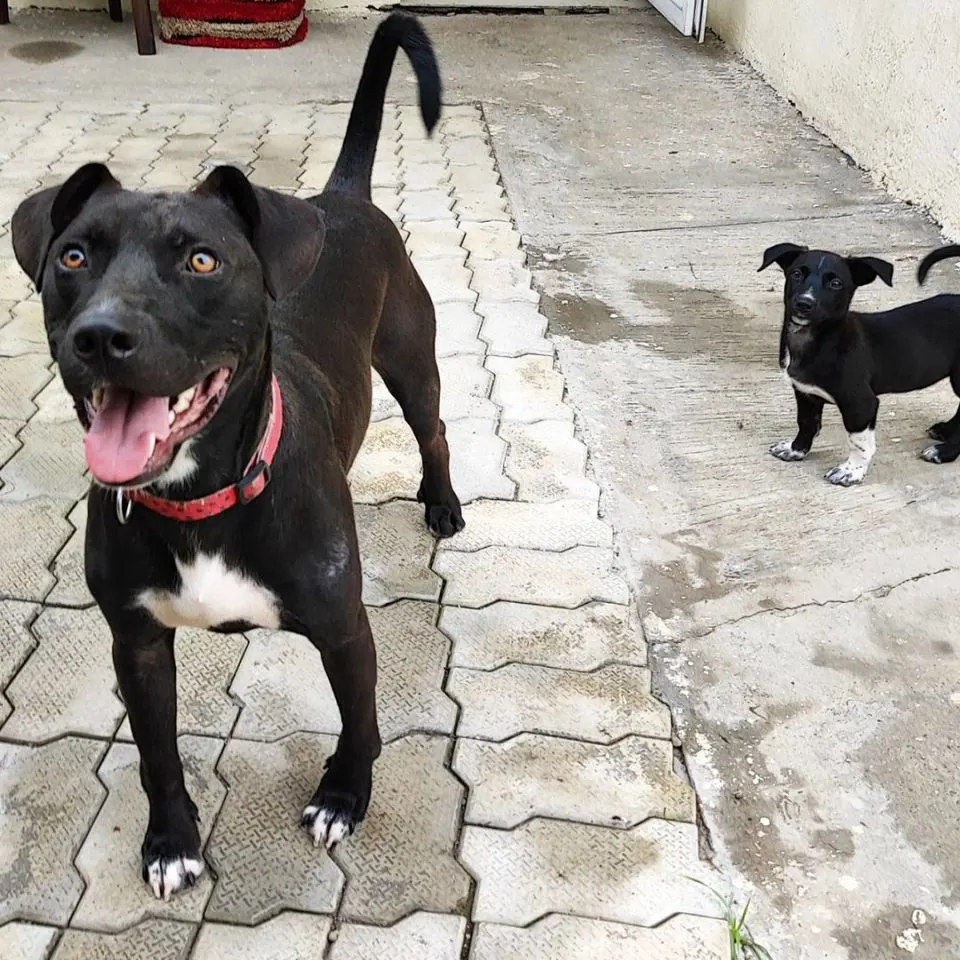Driving around their neighbourhood, a group of rescuers noticed a really sad and disturbing scene.
A little puppy was abandoned, all alone and tied to a pole on a sidewalk. The rescuers immediately stopped their scooter and approached the poor pup.
Rescue Mission

The dog was lying down on the cold ground, waiting for somebody to notice him and come and help.
However, as soon as he saw the rescuers, he excitedly stood up on his paws and showed the team why he had been abandoned in the first place.
“He was left tied on the pole by a nearby shop owner who didn’t want to take care of him because of his bent legs,” said Yogita, one of the rescuers.

The team untied the poor pup and gently picked him up, putting him on their scooter and driving him to a shelter.
At that moment, the pup knew he was finally safe and wanted.
Help Is Here
The puppy, later given the name, Abby, unfortunately had his legs bent inward, which caused him to have some trouble walking.
He couldn’t walk long distances or even stand on his paws for a longer period of time because of the pain it caused him.

However, even in this condition, the pup excitedly jumped up and down, unable to contain his excitement when he realized that he was finally being rescued.
He kept loving us and licking us throughout the time we held him.
Yogita took the little pup to the vet in order to see how she could help improve his condition. The vet determined that Abby’s bowed legs were caused by poor nutrition.
Since Abby’s rescuer was extremely determined to do as much as she could, even though the healing process took a while, the puppy is now able to run and play just like any other dog.

Seeing how brave and resilient Abby was, Yogita and her family simply couldn’t part ways with him.
Yogita already had a pack of rescue dogs at her home, so Abby was not only surrounded by loving hoomans, but also by very adorable furry friends.
His recovery journey was a long one but filled with so much love, and today he is living the best life he could ever have with his siblings.

Medical Diagnosis
The condition this pup suffers from is called Bowed Legs, and it is a deformity that causes the legs of a dog to appear curved, not straight.
This can be caused when a dog grows too fast, not giving the bones enough time to develop.
It can also be due to nutrition deficiencies since the bones rely on certain vitamins and minerals that help them to have optimal development.
Another reason for bowed legs can be because of an injury the pup suffered from before his bones got strong enough, or lastly, it can simply be due to genetics.
If you’ve ever leaned in to give your furry friend a cuddle and caught a whiff of something fishy, you’re not alone. That distinct aroma of fish emanating from your dog can leave you puzzled. As a seasoned dog enthusiast, you know that our canine companions are full of surprises, and their unique scents can sometimes raise eyebrows.
When your dog starts to smell like a seafood buffet, it can be a head-scratcher. From their diet to their skin health, various factors can contribute to this intriguing phenomenon. As someone who adores their four-legged pal, understanding the reasons behind this fishy fragrance can help you ensure your pup is happy, healthy, and odor-free.
Understanding the Fishy Scent in Dogs
The Science of Canine Odor
Ever wondered why your dog sometimes smells like fish? Well, it all boils down to science. The natural oils produced by your dog’s skin can sometimes oxidize and create that fishy odor. This happens when these oils react with bacteria on the skin, leading to a distinct smell that resembles fish.
Common Reasons for the Fish-Like Smell
There are a few common reasons why your dog might emanate a fishy scent. One frequent culprit is their diet. Foods high in omega-3 fatty acids, such as fish, can transfer their scent to your dog’s skin and coat, causing them to smell like fish. Another reason could be skin infections or allergies, which can lead to changes in your dog’s natural scent, resulting in a fish-like odor.
Diet and Nutrition
The Impact of Fish-Based Foods
If your dog’s diet includes fish-based foods like salmon or tuna, it might be the reason they smell like fish. These foods are rich in omega-3 fatty acids, which are beneficial for your dog’s health but can also contribute to a fishy odor. The oils from fish can sometimes be released through your dog’s skin, giving them a distinct scent.
Additives and Supplements That May Cause Odor
Certain additives and supplements in your dog’s food can also be a culprit for that fishy smell. Check the ingredients of your dog’s food for any fish-derived additives or supplements like fish oil. While these can have health benefits, they may also result in your dog emitting a fish-like odor. Be mindful of what you feed your furry friend to help manage any unexpected smells.
Anal Glands and Their Role
What Are Anal Glands?
Dogs have two small glands on either side of their anus, known as anal glands. These glands produce a smelly, oily substance that is meant to mark their territory. Normally, when a dog defecates, these glands release a small amount of this substance, leaving a distinct scent that other dogs can identify.
How Impacted Anal Glands Contribute to Odor
Sometimes, a dog’s anal glands can get clogged or impacted. When this happens, the fluid inside the glands can’t be released naturally. This blockage leads to discomfort and can result in a strong, fishy odor emanating from your dog. If you notice your dog scooting its bottom on the floor or excessively licking its behind, it could indicate an issue with their anal glands that needs attention.
Remember, keeping your dog’s anal glands healthy is crucial in preventing any unpleasant odors. If you suspect a problem, it’s best to consult your vet for proper care and treatment.
Dental Health and Oral Hygiene
Tooth Decay and Gum Disease
If your dog has a fishy smell, it could be linked to dental issues. Tooth decay and gum disease can cause bad breath and unpleasant odors. Bacteria in the mouth can lead to a fish-like scent when they interact with food particles and saliva. Ensuring your dog’s dental health is essential to prevent these odors.
The Link Between Oral Health and Bad Odors
Maintaining good oral hygiene is crucial for preventing your dog from smelling like fish. Poor oral health can result in bacteria buildup, leading to foul odors. Regular brushing, dental chews, and professional cleanings can help keep your dog’s breath fresh and prevent any fishy smells. Remember, a healthy mouth means a happy dog with better smelling breath.
Ear Infections and Skin Conditions
Recognizing the Signs of Ear Infections
If your dog smells like fish, ear infections could be a likely culprit. Look out for signs such as constant head shaking, redness or swelling in the ears, unusual discharge, and odor coming from the ears. If you notice these symptoms, it’s essential to consult your vet for a proper diagnosis and treatment.
Skin Issues That Can Lead to Odor
Skin problems are another common cause of fishy odors in dogs. Conditions like yeast infections, dermatitis, or bacterial infections can result in an unpleasant smell. Check for redness, flakiness, excessive itching, or hair loss on your dog’s skin. Proper diagnosis and treatment from a veterinarian can help address these skin issues and eliminate the odor.
Grooming and Cleaning Routines
The Importance of Regular Baths
Bathing your dog regularly is essential in keeping them clean and fresh-smelling. Washing away dirt, oils, and odors that can accumulate on their skin and coat helps prevent any fishy smells. Use a dog-specific shampoo to avoid irritating their skin, and make sure to rinse thoroughly to remove all soap residue.
Choosing the Right Grooming Products
Selecting the appropriate grooming products for your dog is crucial for maintaining their hygiene and scent. Opt for products that are designed for dogs and suited to their skin type. Avoid using human shampoos or harsh chemicals that can cause skin dryness and irritation, potentially leading to odors. Invest in quality brushes and combs to keep your dog’s coat tangle-free and healthy.
When to See a Vet
Identifying Alarming Symptoms
If your dog continues to smell like fish despite dietary adjustments and grooming routines, it’s time to consult a vet. Persistent fishy odors can be a sign of underlying health issues that need professional attention. Look out for other symptoms like excessive scratching, redness, swelling, or discharge on your dog’s skin, ears, or paws. These could indicate infections or allergies contributing to the odor.
Treating Underlying Health Issues
When it comes to addressing the root cause of your dog’s fishy smell, a vet visit is essential. Your veterinarian can conduct a thorough examination to identify potential health issues like skin infections, yeast overgrowth, or dental problems. Treatment may involve prescribed medications for infections, dietary changes, or specialized grooming products. Follow your vet’s recommendations closely to help your furry friend get rid of the fishy smell and improve their overall health.
Conclusion
So, if your dog is giving off a fishy smell, remember to consider their diet, skin health, and dental care. Omega-3 fatty acids, skin infections, and dental issues could be the culprits. Regular baths with dog-specific shampoo and proper grooming routines are key to keeping your furry friend smelling fresh. Don’t forget to check for ear infections and skin conditions that may be causing the odor. And if the fishy scent lingers despite your efforts, it’s best to seek advice from a vet to rule out any underlying health concerns. Keep your pup happy and odor-free with these simple tips!
Frequently Asked Questions
Why does my dog smell like fish?
Dogs can smell like fish due to various factors, including diet, skin health, and infections. Omega-3 fatty acids, skin infections, and fish-based foods can contribute to the odor. Maintaining a balanced diet and monitoring anal gland health can help manage the smell.
How does dental health affect my dog’s breath?
Poor dental health can lead to bad breath in dogs. Issues like tooth decay and gum disease can cause unpleasant odors. Regular dental check-ups and proper oral hygiene, such as brushing your dog’s teeth, are essential for fresh breath.
What role do grooming routines play in managing odors?
Regular bathing with dog-specific shampoo, proper grooming products, and tools are crucial in preventing odors. Grooming helps maintain hygiene, prevent skin irritation, and enhance your dog’s overall scent. It is important to choose grooming products suitable for your dog’s skin type.
When should I consult a vet about my dog’s fishy smell?
If the fishy smell persists despite dietary changes and grooming efforts, consulting a vet is recommended. A vet can diagnose underlying health issues like infections or allergies, offering treatment options such as medications, dietary modifications, or specialized grooming products. Veterinary guidance can help address the root cause of the fishy odor.
[no_toc]

Hey there, I’m Janet Brooks, a dog-loving student from California. I’m all about helping pups in need, especially those without homes. Me and my awesome friends work together to give shelter and love to stray dogs. Oh, and I also write blogs about dogs to share helpful info.